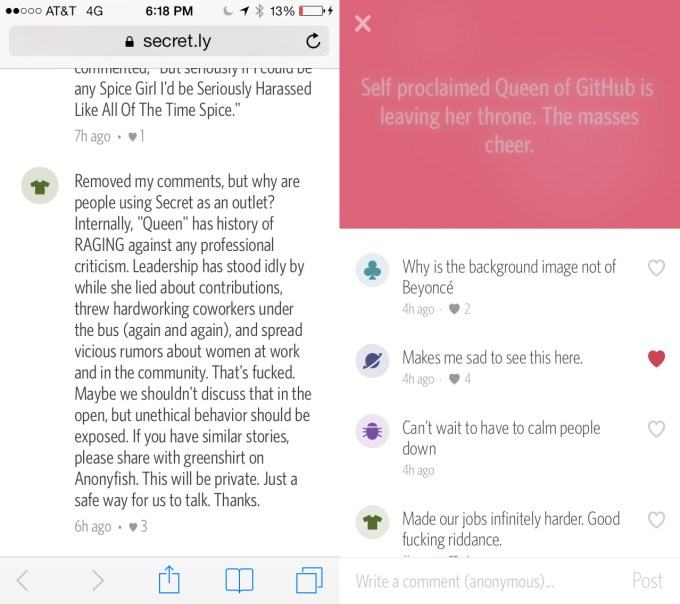The exit of engineer Julie Ann Horvath from programming network GitHub has sparked yet another conversation concerning women in technology and startups. Her claims that she faced a sexist internal culture at  GitHub came as a surprise to some, given her former defense of the startup, and her internal work at the company to promote women in technology.
In her initial tweets on her departure, Horvath did not provide extensive clarity on why she left the highly valued startup, or who created the conditions that led to her leaving and publicly repudiating the company.
Horvath has given TechCrunch her version of the events, a story that contains serious allegations towards GitHub, its internal policies, and its culture. The situation has greater import than a single person’s struggle: Horvath’s story is a tale of what many underrepresented groups feel and experience in the tech sector.
According to Horvath, she joined GitHub in 2012 when the company was “still pretty small†and its culture was supportive of the women on its staff. She was, at the time, the “only female designer [or] developer on the team.†Despite its generally female-friendly environment, Horvath claims that she had “a really hard time getting used to the culture, the aggressive communication on pull requests and how little the men [she] worked with respected and valued [her] opinion.â€
 Why did Horvath work for GitHub? She “loved the idea of GitHub because it was the place people went to make things for people who make things,†she wrote in an email to TechCrunch.
Why did Horvath work for GitHub? She “loved the idea of GitHub because it was the place people went to make things for people who make things,†she wrote in an email to TechCrunch.
In light of that, Horvath told us that she “participated in the boy’s club upon joining,†but when her “character started being discussed in inappropriate places like on pull requests and issues,†the situation changed.
In short, Horvath said that she felt she was being treated differently internally simply due to her gender and not the quality of her work. She calls her colleagues’ response to her own work and the work of other female GitHub employees a “serious problem.†Despite GitHub hiring more female developers, she “struggled to ever feel like [she was] welcome,†she wrote.
Adding to the already difficult situation was the wife of a founder, who she did not name in her email to us. Horvath says she did her “best to distance myself from her as well as the founder for fear of being caught up in an unhealthy situation,†but, as she told TechCrunch, she failed to “move quickly enough.â€
The wife of the founder asked Horvath out for drinks, which she agreed to. In her own words: “Of course I agreed seeing as she was my boss’s wife and I’m always looking to meet women I can look up to.â€
Instead of it being a friendly meetup, the wife in question began to boast, stating that she “informs her husband’s decision-making at GitHub.†As Horvath holds, the wife said that Horvath “better not leave GitHub and write something bad about them,†and that “she had been told by her husband that she should intervene with [Horvath's] relationship to be sure [Horvath] was ‘made very happy.’†The wife wanted Horvath to be happy, “so that [Horvath] wouldn’t quit and say something nasty about her husband’s company because ‘he had worked so hard.’â€
We are awaiting comment from GitHub regarding these allegations and GitHub says they are looking into it. It is not clear why this founder or his spouse appear to have felt threatened by Horvath’s employment.
The wife went on to claim that she was, in Horvath’s retelling, “responsible for hires at [GitHub], and asked her “to explain to her what [she] was working on.†The wife also claimed to employ “spies†inside of GitHub, and claimed to be able to, again according to Horvath, “read [GitHub employee's] private chat room logs that only employees are supposed to have access to.â€
Horvath called the situation, aptly, “bananas.â€
In her email to TechCrunch, Horvath says she felt “confused and insulted to think that a woman who was not employed by my company was pulling the strings.†She also felt “bullied by someone with perceived power and influence over [her] personal relationship and my career at GitHub.â€
In retrospect, Horvath feels like should have “handed in her resignation†following the episode.
Horvath then told her partner, also a GitHub employee, about what was happening. She warned him against being close to the founder and his wife, and asked him not to relay information to them. According to Horvath, her partner “agreed this was best,†and he had talked with the founder’s wife, who agreed to give Horvath space.
Instead of the issue blowing over, Horvath received a meeting request from HR at GitHub, and was asked to “relay the details of that personal conversation that took place out of the office.†Horvath recalls that she was “uncomfortable with this but complied to the best of my ability.†Her partner was also asked for a retelling of past events.
Radio silence ensued for a month, according to Horvath, while rumors cropped up that the founder was asking other employees about her and her relationship with her partner. To Horvath, the silence made her think that she was “being bullied into leaving.â€
At this point, Horvath began to feel “threatened.†Having her “personal relationship†dragged into her “work life and put on show for [her] coworkers†didn’t sit well with her. The aforementioned wife began a pattern of passive aggressive behavior that included sitting close to Horvath, to, as she told TechCrunch, “make a point of intimidating†her.
This stalemate ended when the founder asked to see her. Horvath said that she “wasn’t going to put myself in a position like that, so I required HR be present if we were to meet.†The meeting did not go well.
According to Horvath, the founder accused her of “threatening his wife, who she had “not interacted with or contacted since [the wife] asked [her] out to drinks.†Horvath cried during the episode, as she said the founder both “chastised†her, and called her a “liar.†He ended the meeting by saying that it was “bad judgement†to date coworkers (referring to her relationship, which was with another employee at GitHub) and then left. Horvath recounts sitting there after his departure both “crying and shaking uncontrollably.â€
We are waiting for comment from GitHub about these allegations.
Horvath later learned that the founder had a similar talk with her partner, and demanded that he resign. Her partner is still at the company.
In Horvath’s view her options were limited, given that “HR and the other founders had allowed this to happen even after being made aware of his and her behavior.†It wasn’t clear whom she could turn to.
While the above was going on, Horvath had what she referred to as an awkward, almost aggressive encounter with another GitHub employee, who asked himself over to “talk,†and then professed his love, and “hesitated†when asked to leave. Horvath was in a committed relationship at the time, something this other employee was well aware of, according to her.
The rejection of the other employee led to something of an internal battle at GitHub. According to Horvath, the engineer, “hurt from my rejection, started passive-aggressively ripping out my code from projects we had worked on together without so much as a ping or a comment. I even had to have a few of his commits reverted. I would work on something, go to bed, and wake up to find my work gone without any explanation.†The employee in question, according to Horvath, is both “well-liked at GitHub†and “popular in the community.â€
His “behavior towards female employes,†according to Horvath, “especially those he sees as opportunities is disgusting.â€
Seeking to create something positive out of the above complexity, Horvath decided to start Passion Projects, an initiative that she now claims “wasn’t just to fix tech,†but was also something designed to “fix GitHub and to strengthen the support network for women who might be experiencing similar things.â€
Yet things failed to improve internally. Horvath calls the next period “uglier,†saying that the wife of the founder continued to show up at the office, sit next to Horvath, and “glare at [her] for extended periods of time as if trying to provoke a reaction.† After a spell, “spending a lot of time in the women’s bathroom crying,†Horvath spoke to a different founder, who was “sympathetic†and promised to “address†the situation with the other founder and his wife.
The first founder asked to meet. Horvath accepted. The founder apologized, and admitted to having “inappropriately escalated the situation.†His wife, he said, would work from home from then on. The wife, to be clear, was not a GitHub employee.
Instead of getting gone, the wife appeared the next day and “planted herself right in front†of Horvath. Horvath pinged various executives who were “busy,†but willing to help eventually.
The situation wasn’t merely passively painful, according to Horvath it became virulent:
The next thing I knew the wife was in my face at my work station verbally attacking me. She demanded to speak with me in private to which I said no. I asked her in a very calm way to leave me alone and told her she was making me uncomfortable. There is an eye-witness to this event.
I was shaking in horror and felt my adrenaline pumping harder than ever before. I was proud of myself for not reacting, though.
I decided to work from home for a while.
HR eventually asked the wife to not be on the same floor as Horvath. But, according to Horvath’s recount, “she continued to find her way in and plant herself right next to wherever I was working.†This continued until her exit from the firm this past Thursday.
The final straw for Horvath came when she saw men gawking at women who were hula-hooping at the office. She called the episode “a really ugly and inappropriate scene. Her words:
Two women, one of whom I work with and adore, and a friend of hers were hula hooping to some music. I didn’t have a problem with this. What I did have a problem with is the line of men sitting on one bench facing the hoopers and gawking at them. It looked like something out of a strip club. When I brought this up to male coworkers, they didn’t see a problem with it. But for me it felt unsafe and to be honest, really embarrassing. That was the moment I decided to finally leave GitHub.
Horvath told TechCrunch that she thought she “could fix GitHub.†She now claims that she was wrong.
Â

After working with HR to secure and announce a simple exit from the firm, someone posted a very unkind post to the Secret social network concerning her tenure. Her exit, at that time, was still confidential. She contacted Secret asking for the post to be removed. Horvath claims the post was not taken down initially. TechCrunch has confirmed with Secret that it was eventually removed.
The Secret post is what led Horvath to “speak up.†Instead of seeking attention, Horvath wants “someone [to be] finally held accountable.â€
GitHub says it is investigating the matter: “We’re looking into this.â€
No comments:
Post a Comment